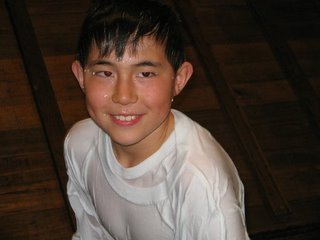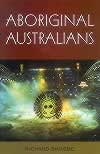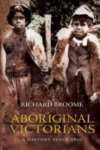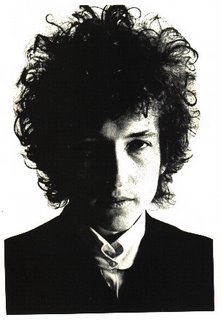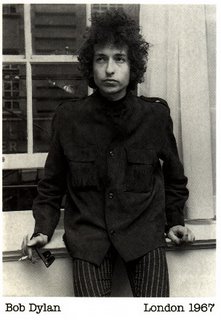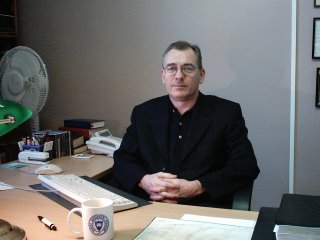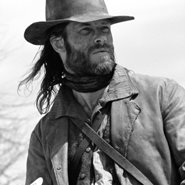
On Boxing Day I took the family to see King Kong. It was an absolute roller-coaster ride of an action movie and a worthy follow up to the Rings trilogy for our little Kiwi friend (thank God for the Peter Jacksons of this world.) Okay the dinos didn't break any new ground visually (there really hasn't been any advances on that score since Jurassic Park) but the way the scenes with them were shot - the editing, for example in the stampede scene and in the 10 minute triple-Rex brawl, was really first rate. The way Ann Darrow (Naomi Watts) was shot (cinematically that is) while she was being carried through the jungle in Kong's grip at a blistering pace really reproduced what such a ride would be like for a real person, not just for a barbie doll kind of prop. I found the exposition in the first half hour to drag a bit, but still it certainly had interesting elements. But once they hit Skull Island (what a great landing scene!) it was eye-popping action all the way. (But hey what happened to that great scene in the trailer where they're filming on the beach, Ann screams and Kong roars back in reply? It didn't seem to make it into the final cut - I guess it'll be on the [extended cut?] DVD).
The way the crew had to deal with one nasty creature after another without much of a letup at all was great and actually quite reminiscent of the original which had very similar pacing. The bug creatures were the most interesting (and gruesome) new element but I think I would have preferred pterodactyls to giant bats in the rescue of Ann scene. I loved all the references to the original. When they're looking for a female lead they complain because "Fay" (presumably Wray) is unavailable because she's "doing a picture with RKO." When they're still on the ship and doing some screen tests Ann and her male lead recite exactly the lines actually spoken in the original (corny overacting and all). When they're in New York the natives in the stage show are wearing the same costumes and makeup as the natives on the beach in the original.
The impression given by the trailer that Jackson was going to follow the original VERY closely was misleading because there are enough original touches to make it a departure in a lot of ways, while still being an obvious homage (some of the dialogue was word-for-word from the original - which I thought was cool to watch for eg, "It wasn't the planes but beauty killed the beast.") Giving more dimension to the captain and crew members of the tramp steamer was good and made their deaths (for example the black guy who had befriended the young thief) more involving. Turning Jack Driscoll (Adrian Brody) into a playwrite and developing the romantic element more was a good move. Casting Jack Black as Carl Denham was a stroke of genius because he is perfect in the role - a scoundrel but a likeable one.
The most talked about development from the original is the way the relationship between Ann and Kong is more developed and I think this is handled well. It isn't sexual (eeeew!) or even romantic, but more platonic. The moment after the battle with the T. Rexes when she realises she is safer with Kong than without him is great. She sympathises with this magnificent creature (after all he's just defending his turf). He's the last of his kind (you'll notice a few gorilla skulls in Kong's lair, indicating that there were once other Kongs [he had to have come from somewhere] but that these had all died and he was the last of his tribe). Some have said the original had a sub-text of the white man's fear of the savage black man violating the purity of white women. Whatever may be said of that thesis, that's definitely not what's going on here. This is more about how there can be profound relationships between different species (any pet owner knows this) and also about how human beings either act in fear toward other animals or in entirely exploitative ways. (If we can't make a buck out of this creature we'll kill the thing and have done with it.) There's some interesting animal rights and animal theology reflections here. If anyone has a soul, Kong does. He admires the beauty of a sunset, he understands and communicates the concept of "beautiful." He is capable of a deep relational attachment and of jealousy. We all feel sorry for Kong when he meets his final demise, so far from his ancestral home, exiled in the concrete jungle of New York. We want a better kind of world where all of God's creatures can live together in harmony. In the new heavens and the new earth the lion will lie down with the lamb, the little child will play by the hole of the cobra and the silverback gorilla will cavort with his human friends in a habitat shared by all. Until then creation, human and non-human, continues to groan for deliverance.

